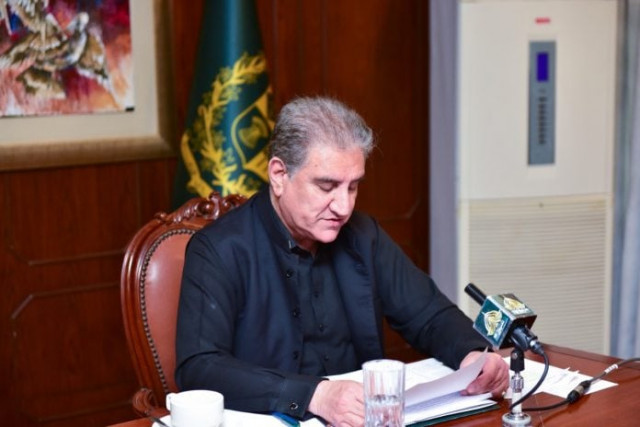OIC agrees on Kashmir ‘action plan’
Qureshi says bloc to go beyond resolutions on longstanding dispute

Pakistan on Wednesday said that the Organisation of Islamic Cooperation (OIC) agreed on an “action plan” to go beyond resolutions on the longstanding issue of Jammu and Kashmir as the foreign ministers from the 57-member Islamic bloc on Wednesday called for an immediate cessation of hostilities in Ukraine.
The two-day conference, which was attended by 46 ministerial delegations, concluded in the federal capital with the adoption of over 140 resolutions, including on Kashmir, Palestine, Islamophobia and other contemporary challenges facing the Islamic countries.
Foreign Minister Shah Mahmood Qureshi, who is now chair of the OIC Council of Foreign Ministers, told a news conference that a number of decisions had been taken to go beyond resolutions on the issue of Jammu and Kashmir.
Qureshi said Pakistan proposed a ministerial conference that would work with other member states to “chart a way forward” and “adopt a clear action plan” on the issue of Kashmir.
“In this session it was my desire that the issue of Jammu and Kashmir must be discussed and highlighted because I feel since August 5, 2019, the situation has dramatically changed and deteriorated further,” he said while addressing the joint news conference with the OIC secretary general.
He said the OIC Contact Group that met on the sidelines of the conference took a number of decisions on Kashmir.
“We have agreed to beyond passing resolutions. We have put together an action plan,” Qureshi said.
According to the foreign minister, different member states would meet regularly and coordinate their positions on the question of the Jammu and Kashmir dispute and also monitor the deteriorating situation in the disputed territory.
The OIC representatives would work closely with each other at the UN headquarters in New York, UN Human Rights Council in Geneva and the OIC headquarters in Jeddah.
“We have a clear plan of action for member states, for the members of the contact group and for the secretariat and the secretary general of the OIC and for the special envoy on Kashmir,” Qureshi claimed.
At the opening session of the conference, Prime Minister Imran Khan regretted that the OIC despite representing 1.5 billion people could not make an impact on the issues of Palestine and Kashmir.
He said he felt said that the OIC had failed both the people of Palestine and Kashmir. Pakistan has been seeking support of the OIC, particularly its oil-rich Arab members, for the Kashmir cause.
While Qureshi claimed scoring a success on Kashmir at the OIC conference, investors from Saudi Arabia and UAE attended an investment conference held in Indian Illegally Occupied Jammu and Kashmir.
The OIC member states in the Islamabad Declaration expressed grave concerns over the recent incident of India “accidently” firing a missile into Pakistan.
“We express grave concern over the violation of Pakistan’s airspace, threat to passenger aircraft and dangers to peace and security in South Asia arising from the launch of supersonic missile on March 9, 2022 by India,” read the declaration.
“We call on India to fully abide by international law and norms of responsible state behaviour and conduct a joint probe with Pakistan to accurately establish facts,” it added In the final declaration the OIC member countries called for the immediate cessation of hostilities in Ukraine.
The OIC expressed its willingness to facilitate a dialogue between Ukraine and Russia.
The member states also called for establishing corridors for the safe movement of civilians and supply of humanitarian assistance.
Qureshi said he was present during a meeting between Prime Minister Imran and Chinese Foreign Minister Wang Yi, who agreed with the Pakistani suggestion to work alongside OIC to mediate on the Ukrainian conflict.
The foreign minister was of the view that Pakistan’s emphasis on finding a political solution stemmed from its fears that the conflict could spill over and expand to other parts of the world.
The OIC council of foreign ministers adopted over 140 resolutions including on Kashmir, Palestine, legal, political as well as issues of security and reforms in the OIC.
The OIC council of foreign ministers also appointed a special envoy on combating Islomophobia.
“This is indeed a great achievement of the OIC,” Qureshi said.
The Humanitarian Trust Fund announced at the extraordinary session of OIC in December in Islamabad has also been operationlised.
Qureshi said the OIC extraordinary session in December helped drew the world’s attention towards the humanitarian crises in Afghanistan.
He said since then a number of concessions were given to Afghanistan, sanctions had been eased and humanitarian assistance started reaching people, according to Qureshi. Pakistan also proposed to establish mechanism and tools to prevent conflict within the Muslim countries. Lack of unity has been one of the challenges that faced the OIC.
Certain member states have divergent interests and often use proxies to advance their strategic objectives. Qureshi said Pakistan wished to act as bridge between the Muslim states.



















COMMENTS
Comments are moderated and generally will be posted if they are on-topic and not abusive.
For more information, please see our Comments FAQ